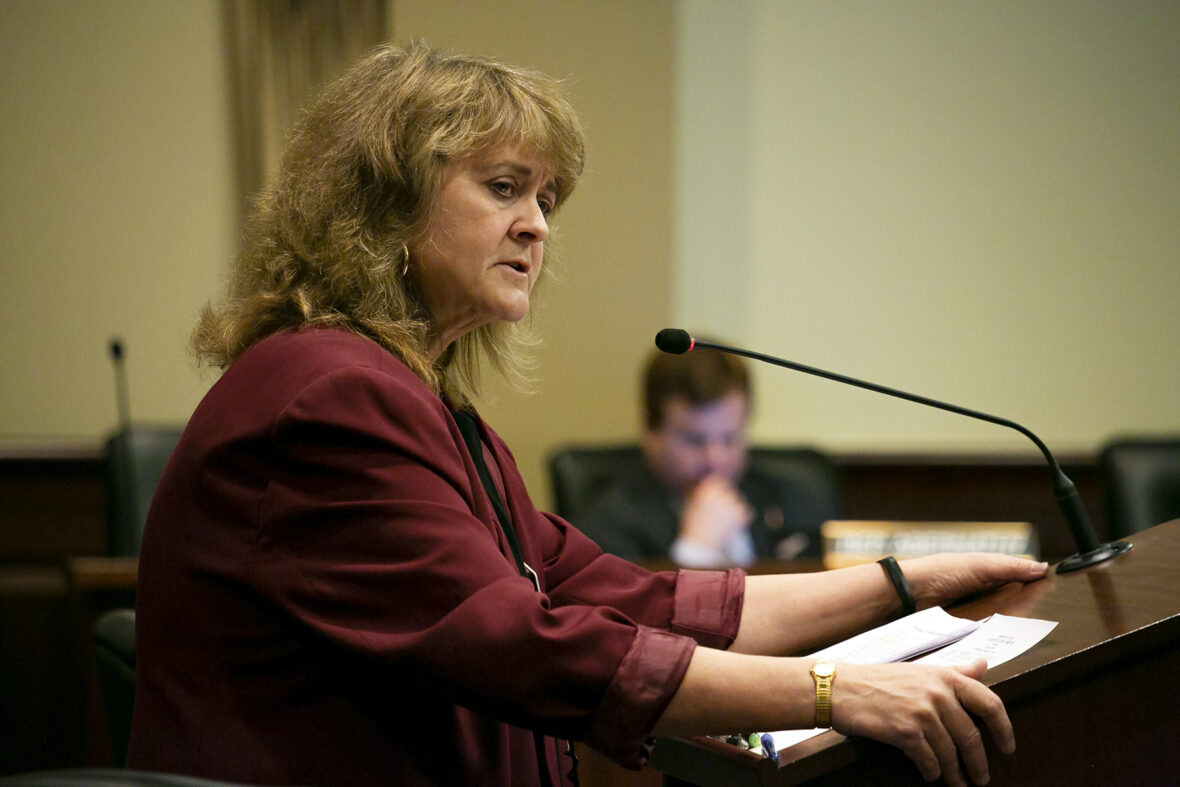A bill to ban transgender girls and women from participating in girls’ and women’s sports will get a hearing Wednesday.
The House State Affairs Committee will take up the bill at 9 a.m. Wednesday, in Room EW40 on the Statehouse’s underground garden level.
House Bill 500 was unveiled last Wednesday in the House Education Committee — which held a brief and somewhat heated introductory hearing. But late last week, House leadership assigned HB 500 to House State Affairs, a far-reaching panel that often addresses hot-button social issues.
House leadership has latitude to assign bills to committees. On Tuesday, House Speaker Scott Bedke told Idaho Education News that State Affairs usually handles bills pertaining to the Idaho High School Activities Association — the state’s governing body for high school athletics.

The move appeared to catch some key lawmakers off guard.
“We just get the assignments,” House State Affairs Chairman Steven Harris, R-Meridian, said in an email Monday afternoon.
“Apparently State Affairs is where this type bill has gone in the past,” House Education Chairman Lance Clow, R-Twin Falls, said in an email Monday evening.
HB 500’s sponsor, Rep. Barbara Ehardt, said she was surprised her bill started out in House Education in the first place. The Idaho Falls Republican said she has been working with House and Senate State Affairs committee members on this issue for months.
“But I’ll present wherever they put me,” Ehardt said in an email late Monday evening.
House State Affairs could hear another bill related to transgender rights: House Bill 509, which would prohibit Idahoans from changing the gender markers on their birth certificate. That bill has also been routed to House State Affairs.
ISBA Day on the Hill
During an annual lobbying trip to the Idaho Statehouse, a few school trustees let House Education Committee members know the seriousness of social-emotional learning and students’ mental wellness.
Two of the six trustees who testified said students are dying by suicide across the state, and mental wellness needs to be a top priority.
“Mental health issues, including suicide, depression and bipolar disorder are very real,” West Bonner School Board member Margaret Hall said. “Not only have these issues personally impacted students and staff in the small district of West Bonner County, they have also impacted my immediate family.”
Tuesday’s comments from trustees were especially noteworthy in light of a Feb. 11 hearing in which several House Education Republicans displayed open hostility toward Superintendent of Public Instruction Sherri Ybarra’s $1 million proposal to address social-emotional learning and mental wellness.
Post Falls trustee Michelle Lippert said two district students have died by suicide this year, with the most recent death on Feb. 7.
“As you can imagine, the Post Falls community has been shaken to its core,” Lippert said.
“I know that questions have been raised about the value of social-emotional learning,” Lippert continued. “There is no simple solution that will prevent all suicides. Human pain is complex. Yet if these programs save 50 students, 10 students or even two students, wouldn’t that be enough?”
Post Falls Republican Rep. Tony Wisniewski did not respond to Lippert’s testimony. During that Feb. 11 committee hearing, Wisniewski asked his fellow legislators to take a trip back in time to when they attended school, a time where there was mutual respect and discipline, he said. When students got out of line, Wisniewski said last week, parents “would take us to the woodshed, if necessary.”
House Education’s social-emotional learning hearing is drawing national attention. On Thursday, Education Week published a lengthy article on the Idaho hearing, and the national social-emotional debate.
Budget-writers slash unauthorized CTE spending
Lawmakers took nearly $265,000 from the state’s career-technical education program Tuesday — because the money wasn’t going where legislators expected it to go.
At issue was a supplemental line item for the current budget year, ending June 30. Lawmakers approved the line item because they were told it would cover a shortfall for high school CTE programs.
But that wasn’t the case. In January, CTE administrators said the money would actually go to backfill INSPIRE, a training program for new high school CTE teachers.
In slicing the $264,800 out of the CTE budget, Joint Finance-Appropriations Committee members stressed two points.
First, Rep. Paul Amador, R-Coeur d’Alene, said the current CTE administration had nothing to do with the budget snafu. Clay Long was hired as administrator in November, succeeding Dwight Johnson, who announced his retirement in August.
Second, Rep. Wendy Horman said the state needs to fill the CTE teacher pipeline. However, the Idaho Falls Republican said lawmakers are looking at a more affordable solution.
The Senate Education Committee approved one option Tuesday afternoon. Senate Bill 1329 would create a new CTE teacher certification program to replace INSPIRE, while placing about 100 current CTE teachers on the state’s salary career ladder, at a one-time cost of about $187,500.
JFAC voted unanimously to cut this year’s CTE budget, then gave unanimous support to a budget bill for next year. CTE would receive nearly $67.6 million in general fund money for next year, a 1.3 percent decrease.
Like most state agencies, CTE will need to cut 2 percent from its budget in 2020-21, under orders from Gov. Brad Little.
The CTE budget proposal includes a $400,000 line item to help cover growth in secondary programs, as Little had requested.
The CTE budget bill now must pass the House and Senate before it goes to Little’s desk.
STEM Action Center budget
Also voting unanimously, budget-writers approved a $3 million general fund budget proposal for the state’s STEM Action Center.
That proposal is virtually identical to Little’s budget request.
The budget includes a $500,000 line item for the center’s computer science initiative, which provides grants for classroom programs, fairs, devices and software and teacher training. This would be an ongoing line item.
In past years, the STEM Action Center has received one-time transfers for the computer science initiative, ranging from $1 million to $2 million. But unlike past years, the $500,000 is designed to establish a permanent budget.
The STEM Action Center proposal also goes to the House and Senate.
Flexible school schedules
The Senate passed a homeschool-light bill to allow families to pull advanced students out of public school classes for flexible schedules.

The Senate voted 23-11 to pass Senate Bill 1293. Sponsoring Sen. Steven Thayn, R-Emmett, said the bill is designed to implement a pilot program that his grandchildren have tested out.
Under the bill, families of elementary students who are a year or more ahead in school would be able to pull them out of up to 35 percent of required school hours on an annual basis. Parents could pull their students out for full-day or half-day absences for “family activities, recreation, travel and home-based educational activities,” the bill states.
Thayn’s grandchildren use the program to miss school on Mondays, he said recently. Because the local district is on a four-day schedule, that means they attend school three days a week.
Under the bill, the students’ school district would receive full funding, even on the days advanced students are absent.
“It’s kind of a homeschool/public school mix, bringing the best of both together,” Thayn said.
Senate Minority Leader Michelle Stennett, D-Ketchum, and Sen. Janie Ward-Engelking, D-Boise, led the opposition.
Stennett said she was concerned the bill would result in different students being at different levels throughout the year, with the teacher responsible for attempting to keep everyone together. That could create hardships for teachers, who are held accountable for student performance.
Ward-Engelking worried that missing up to 35 percent of required instructional hours is too much. She wondered what would happen if a student worked ahead and took advantage of the flexible schedule, only to fall behind again.
“Is it a punishment instead of a reward?” Ward-Engelking said.
But several Republican senators countered by saying it’s important to empower parents and support families.
“There are learning opportunities outside of the classroom,” said Sen. Kelly Anthon, R-Burley.
SB 1293 heads next to the House, where it will likely be assigned to House Education.
ISAT alternative
House Education Committee advanced a nonbinding resolution designed to start a conversation about replacing the Idaho Standards Achievement Test at the high school level.
Committee Vice Chairman Ryan Kerby, R-New Plymouth, and Thayn are pushing Senate Concurrent Resolution 120.
The resolution requests “the State Board of Education and State Department of Education work together to research options to stop administering the grad 10 ISAT and replace it with another assessment, such as the SAT.”
Kerby and Thayn said the 10th-grade ISAT is virtually worthless because students don’t try on the test, since passing it isn’t a graduation requirement. Meanwhile, the state already pays $1 million per year for all students to take the SAT, whether or not they plan to continue their education after high school. Taking a college entrance exam is a high school graduation requirement, but students don’t have to pass it, and they can choose whether to take the SAT on the state’s dime or pay for another test of their choosing, such as the ACT.
“It’s duplicative,” Kerby said. “We always say we test our kids too much. We have fabulous opportunity to not give us much testing by not giving the 10th grade ISAT.”
The resolution does not call for any changes at the elementary and middle school level, where the ISAT is administered in grades 3-8.
SCR 120 next heads to the full House with a recommendation it pass. The resolution previously passed the Senate Feb. 6 on a voice vote.
